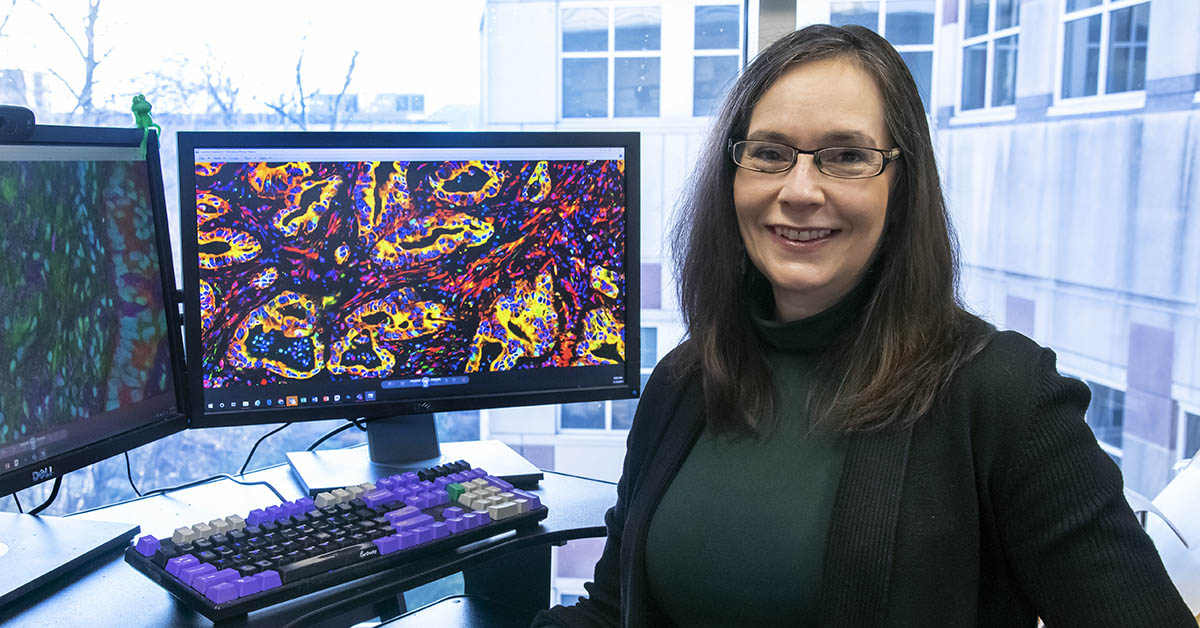
PHILADELPHIA (September 15, 2021)—Fox Chase Cancer Center’s Edna “Eti” Cukierman, PhD, co-director of the Marvin & Concetta Greenberg Pancreatic Cancer Institute, recently published a “Landmark” commentary in the journal Cancer Research that explored the impact of a key study.
The Landmark commentary series was launched by Cancer Research to commemorate the 50th anniversary of the National Cancer Act of 1971, which led to the establishment of the National Cancer Institute and other initiatives. The articles are meant to feature a brief overview of a key cancer-related discovery. Cancer Research, a journal of the American Association for Cancer Research, is one of the world’s top journals in the field of oncology.
Cukierman’s essay, “A Reflection on How Carcinoma-Associated Fibroblasts Were Recognized as Active Participants of Epithelial Tumorigenesis,” provides insight into the impact of the article, “Carcinoma-Associated Fibroblasts Direct Tumor Progression of Initiated Human Prostatic Epithelium,” by Aria F. Olumi, MD, who is now at Beth Israel Deaconess Medical Center/Harvard Medical School, and colleagues. It was published in Cancer Research in 1999. Cukierman was asked to write the commentary based on her expertise in the field of carcinoma-associated fibroblasts.
“By being asked to do this commentary, I’ve been recognized as an expert. That is very humbling, because there were a lot of other people that they could have chosen,” said Cukierman.
In her commentary, Cukierman said Olumi’s study was instrumental in supporting the idea that cancer is a systemic disease that depends on the reciprocal interactions between tumor cells and the tumor microenvironment. The microenvironment is made up of the normal cells, secreted molecules, blood vessels, and other components that surround and feed a tumor cell and which are altered to promote, instead of naturally stalling, tumorigenesis—the formation of tumors.
In illustrating this, Cukierman highlighted the work of, among others, two renowned Fox Chase scientists, Beatrice Mintz, PhD, an expert in developmental cancer biology and genetics, and the late Alfred G. Knudson, MD, PhD, a geneticist and physicist, both of whose earlier work influenced investigators like Olumi and others.
Mintz and her colleague injected cancer cells into a mouse embryo and implanted it in a surrogate mother. Despite being injected with cancer cells, the mouse embryo developed normally and was born completely healthy and cancer free.
“Dr. Mintz was able to demonstrate that normal development is tumor suppressive in spite of the oncogenic mutations these cells had. That was a huge moment where the field completely changed, considering that the local environment where the cells are developing could dictate whether the cell will become cancerous or be influenced to develop normally,” said Cukierman.
“When Dr. Mintz took those cells and put them back in the right place, cancer developed. So it’s not that these cells lost their ability to be cancerous, it’s that they were regulated by the local microenvironment.”
This work, said Cukierman, goes hand-in-hand with the two-hit hypothesis conceptualized by Knudson in the early 1970s. His theory stated that a single mutation in a cell is not enough to cause cancer; another factor needs to come into play for tumorigenesis to take place.
“Knudson is credited with recognizing that there are two types of cancer-causing mutations. One is oncogenic mutations and the other is tumor-suppressive mutations, meaning genes that are normally there to stop cancer development but become mutated and don’t suppress cancer cells anymore,” said Cukierman. “About 40 years later, reflecting on his work, Knudson wrote that the second hit does not have to be a mutation. It can also be an environmental change.”
Cukierman wrote in her commentary that the work of Olumi helped pave the way for contemporary scientists to view cancer as a full-body disease, taking into account that the tumor microenvironment in general, and particularly carcinoma-associated fibroblasts, play a significant role in modulating tumor development and function as a “second hit” that overcomes natural tumor suppression.
“It is not surprising that today’s clinical methods require a consideration of both local and systemic approaches for treating this type of disease. For all these reasons, the work by Olumi and colleagues is more than well-deserving of being highlighted as a ‘Cancer Research Landmark,’” she wrote.